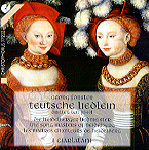In the 16th century, German composer/physician Georg Forster compiled and published the five-volume Teutsche Liedlein, the “most extensive and important collection of German songs” of the period, featuring the music of more than 50 composers, including Forster himself. Most listeners will not be familiar with names such as Caspar Othmayr, Stephan Zirler, or Jobst vom Brandt, but you don’t have to know anything about them to thoroughly enjoy the tuneful beauty and masterful technique that characterize the 19 songs from Forster’s collection that are performed on this very fine program. For my money, the works by Forster himself are the most attractive: he was a master of melody and of the art of the polyphonic song popular at this time, and his music’s congeniality and “rightness” invariably made me pay special attention to every one of his songs even before I knew who the composer was.
In spite of its Italian name, the ensemble I Ciarlatani is a Heidelberg-based group founded in 1982 that specializes in music from the Middle Ages and Renaissance. The voices (soprano, tenor, and baritone) and instruments (cornett, bombard, viola da gamba, and lute) are ideally suited to the music, and it would be hard to imagine more appropriately styled performances. Worthy of special mention are tenor Sebastian Hübner and lutenist Johannes Vogt. It’s too bad that the recorder and lute couldn’t arrive at just a slightly finer degree of tuning that would have made the sections where they play together more comfortable for listeners. Happily, those occasions are rare, and I heartily recommend this disc for all early music fans and for those who ordinarily love well-written and expertly performed songs, but who might understandably overlook such an unpresuming yet memorable–and truly important–program. Complete texts and descriptions of the songs are included. The sound is agreeably warm and intimate.
































